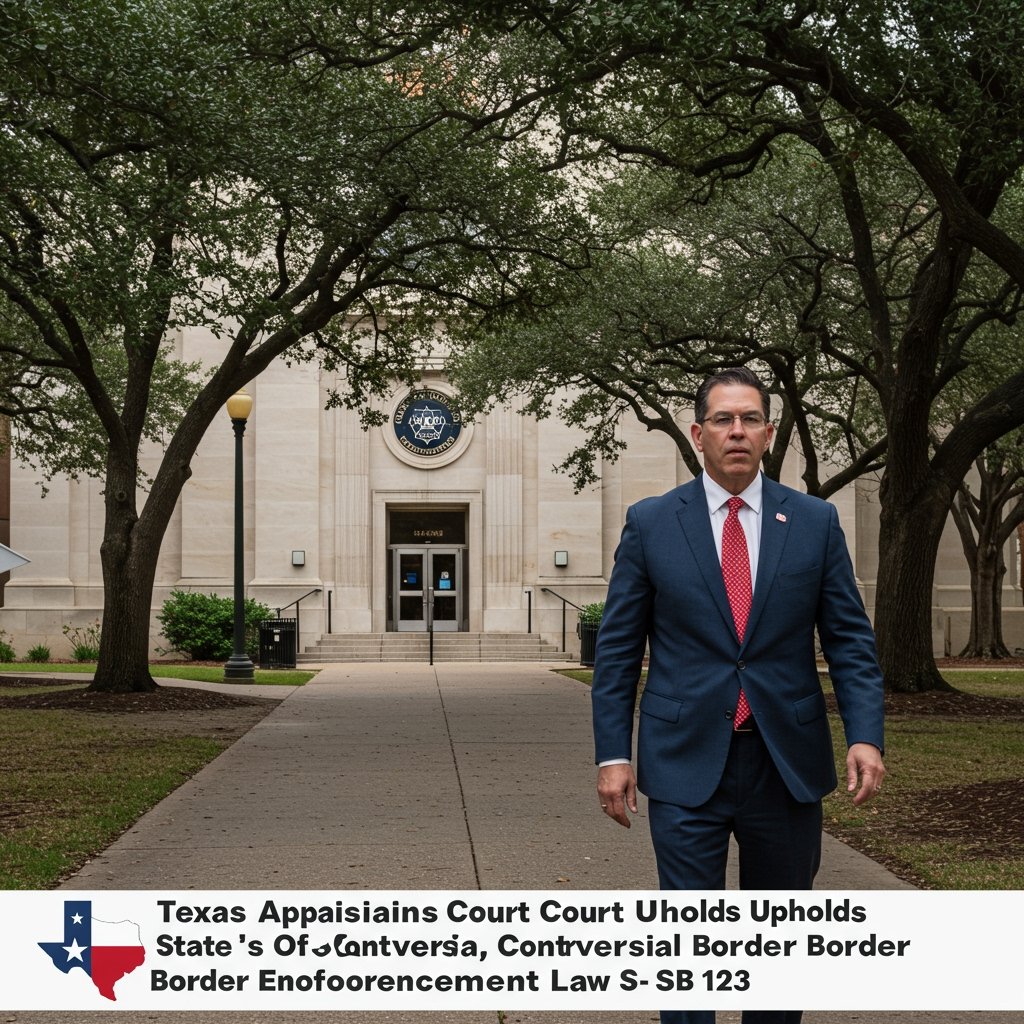Texas Appeals Court Affirms State Authority in SB 123 Border Law Challenge
Dallas, Texas – In a significant legal development regarding state authority over immigration enforcement, the Fifth District Court of Appeals in Dallas on May 15, 2025, issued a ruling that upholds a lower court’s decision supporting the State of Texas’s controversial border security law, designated as Senate Bill 123 (SB 123). The ruling marks a pivotal moment in the ongoing legal and political debate over the state’s role in managing its border with Mexico.
Passed during the 2024 special legislative session, SB 123 is a cornerstone of Governor Greg Abbott’s aggressive approach to border security, commonly known as Operation Lone Star. The law grants state law enforcement personnel, including Texas Department of Public Safety troopers and other authorized officers, new and expanded powers to apprehend and deter individuals suspected of crossing the border illegally into Texas. Proponents argue that the measure is necessary to address what they characterize as a failure of federal authorities to adequately secure the border.
State Leadership Hails Decision as Sovereignty Win
Following the appellate court’s announcement, Governor Greg Abbott lauded the decision as a major “victory for state sovereignty.” In a statement, the Governor reiterated his administration’s commitment to utilizing every available tool and authority to secure the border and protect Texas residents. Abbott and his supporters contend that the federal government has abdicated its constitutional duty to control immigration, leaving states like Texas to bear the brunt of increased crossings and associated challenges. The ruling by the Fifth District Court of Appeals in Dallas provides temporary judicial backing for this assertion of state power in an area historically dominated by federal law.
Legal Challenge and Opponents’ Arguments
SB 123 faced immediate legal challenges upon its passage. A coalition of civil rights groups, including prominently the ACLU of Texas, filed suit arguing that the law is unconstitutional. Their primary argument centers on the principle of federal preemption, asserting that the U.S. Constitution grants the federal government exclusive authority over immigration matters. Opponents contend that SB 123 intrudes upon this federal jurisdiction, creating a patchwork of state-level immigration policies that could conflict with federal law and international treaties.
Furthermore, critics raise significant humanitarian concerns regarding the implementation of SB 123 along the Texas-Mexico border. They argue that granting state law enforcement broad powers to apprehend individuals based on suspected illegal entry could lead to racial profiling, civil rights violations, and potentially exacerbate dangerous conditions for migrants. The ACLU of Texas and other advocacy groups have highlighted potential issues related to due process, detention conditions, and the risk of separating families.
The Path Through the Courts
Prior to reaching the Fifth District Court of Appeals, the case was heard in a lower court, which had ruled in favor of the state, validating SB 123’s provisions against the initial challenges. Opponents of the law promptly appealed this ruling to the Dallas-based appellate court, setting the stage for the May 15, 2025, decision.
The Fifth District Court of Appeals reviewed the arguments presented by both the state, defending its authority under SB 123, and the challenging civil rights organizations, asserting federal preemption and humanitarian risks. While the full details of the appellate court’s written opinion were being analyzed, the core of the ruling, as announced, is the affirmation of the lower court’s stance, effectively allowing SB 123 to remain in effect for the time being, pending further legal action.
Appeal to Texas Supreme Court Expected
In response to the appeals court’s decision, civil rights groups and opponents of SB 123 expressed strong disappointment and immediately vowed to appeal the ruling to the Texas Supreme Court. The ACLU of Texas confirmed its intention to escalate the legal battle, stating that they believe the law fundamentally violates the U.S. Constitution and poses a grave threat to civil liberties and humanitarian principles along the Texas-Mexico border. An appeal to the state’s highest court is a standard procedural step in such high-profile cases involving state law challenges.
Should the Texas Supreme Court agree to hear the case, its decision will be crucial. A ruling from the state Supreme Court could either definitively uphold the law under state interpretation or strike it down. Given the federal preemption arguments involved, many legal observers anticipate that the case is likely to eventually reach the U.S. Supreme Court, regardless of the Texas Supreme Court’s outcome, potentially setting a precedent for state immigration enforcement powers nationwide.
Implications and Future Outlook
The Fifth District Court of Appeals’ ruling is a significant, albeit temporary, victory for the State of Texas in its ongoing efforts to exert more control over border security and immigration enforcement. It allows state authorities to continue exercising the powers granted under SB 123 as the legal challenge progresses. However, the commitment by opponents to appeal to the Texas Supreme Court signals that the legal fight is far from over.
The case represents a key front in the broader national debate over immigration policy and the division of powers between state and federal governments. The outcome of the challenges to SB 123 could have lasting implications for how states perceive and act upon their roles in border security and immigration enforcement in the future. All eyes now turn to the Texas Supreme Court as the next crucial step in this landmark legal case.






